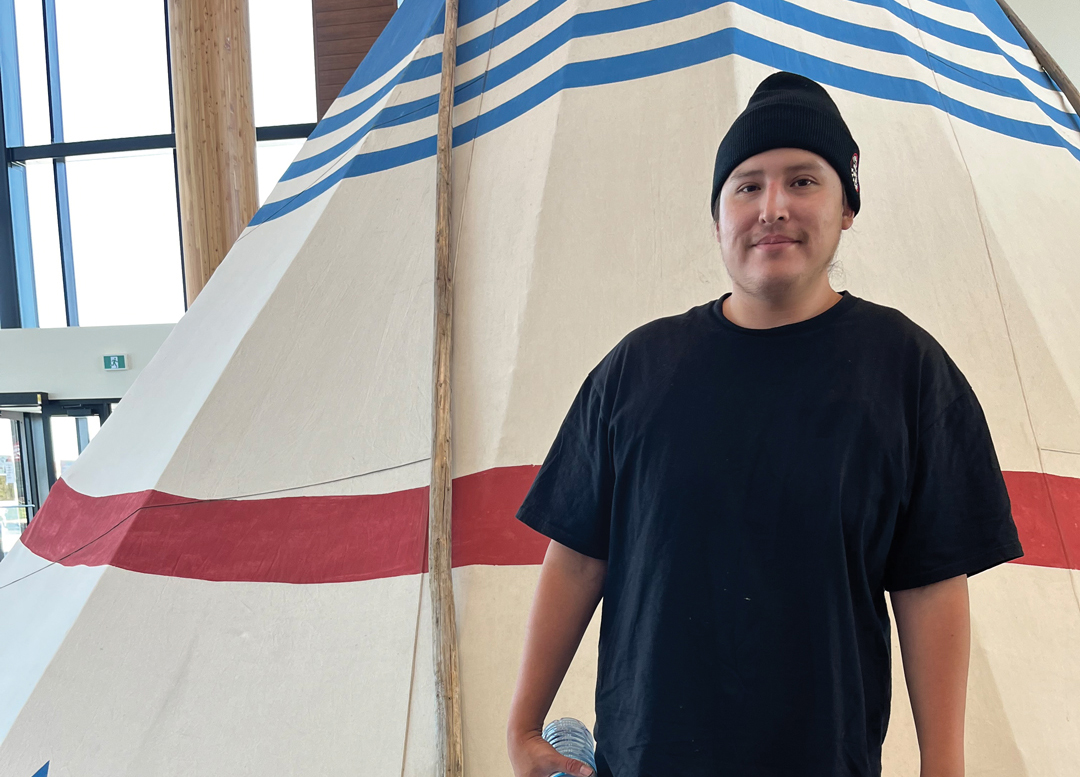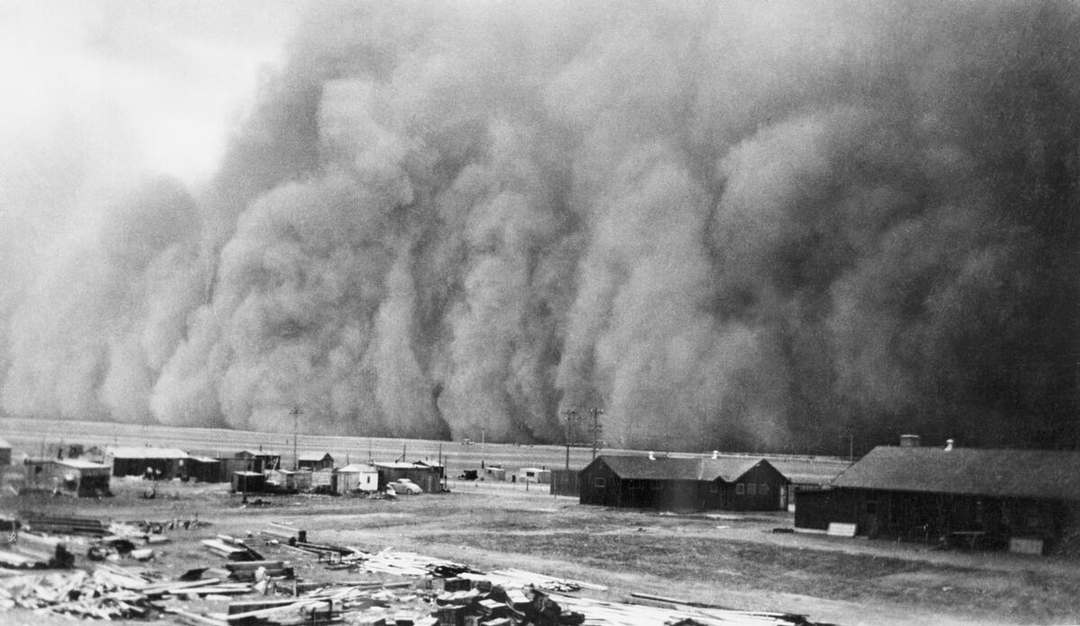FIRST NATION OFFERS AG EDUCATION
STORY AND PHOTO BY IAN DOIG
A member of the Blackfoot Confederacy, the Kainai First Nation, also known as the Blood Tribe, is seriously committed to education, and agriculture is a main component.
On a hot, late-July day, staff, students and community members gathered near Red Crow Community College (RCCC) in its expansive community garden. The College is located southwest of Lethbridge in Stand Off on the 350,000-acre Kainai reserve. Elder Dennis Chief Calf delivered a traditional blessing for the school’s Farm Field Day. “Knowledge is endless,” said Chief Calf, himself a graduate of the RCCC social work program and now an RCCC advisor. “We learn every day.”
Established in 1986, the school was housed in the former St. Mary’s Residential School building, which burned down in 2015. A new, permanent building was opened in October 2022. It features resources such as a historical archive, library and radio broadcast studio and amenities such as a daycare, fitness facility and ceremony room. Since 2019, students have been offered the one-year Niitsitapi Agriculture Certificate while they studied at the RCCC campus with the option to earn a diploma with a second year at Olds College. As of this fall, the two-year diploma in agronomy, animal science and agribusiness is available at RCCC.
A CULTURE OF SELF-SUFFICIENCY
Blackfoot knowledge and culture, which emphasizes compassion, are woven through all RCCC programs, said President Roy Weasel Fat in his own address to the Field Day crowd. “That is the way we live and how we were able to survive in a harsh environment. Our ancestors were self-sufficient, and we want our young people to know this.” The garden was established so students could feed themselves and their families and learn to establish their own gardens at home. “We became so good at gardening, we gave 50 tonnes of potatoes to the food bank,” he said. The garden now also supplies produce to the school’s culinary program.
A graduate of the Lethbridge College agricultural technology program, Weasel Fat worked in the farm industry for 17 years. He went on to study education at the University of Calgary, joined the RCCC staff in 1994 and subsequently earned a master’s of education. In various leadership roles, he was instrumental in the development of RCCC adult literacy programming and the Indigenization of its courses.
“We used to farm and ranch our own land. That’s not the case now,” said Weasel Fat. Farming on the Kainai reserve includes livestock, grain and forage operations as well as a bison restoration project. However, many community members whose families once worked the land now rent or lease to non-Indigenous farmers. RCCC aims to give community members the skills to resume farming. “With our agriculture program, we’re elevating our students and our community,” said Weasel Fat.
Researchers typically sow test plots to study crop performance or assess new growing methods. This research plot, conducted by the College’s agriculture department, is intended as a learning component for students, to assess the potential of commercial crop production on Kainai land and improve the community’s food security.
Weasel Fat turned the proceedings over to Adebusoye Onanuga, who heads the RCCC agriculture, basic science and environmental science programs and is its ag research and curriculum co-ordinator. He designed the school’s agriculture program and heads the field plot project, which is funded by Results Driven Agriculture Research. The two-year, multi-layered study includes the rotation of wheat varieties commonly grown in the area—AAC Brandon, AAC Penhold and AAC Stronghold. Rotations to be studied also include the Sangre potato and lupin. A legume, the latter is being studied for its potential as a nitrogen-fixing cover crop and high-fibre, high-protein food source.
The project will also assess the use of nitrogen fertilizer in the form of rock phosphate, triple super-phosphate and urea, as well as the use of biochar, with the aim to reduce greenhouse gas emissions. NO2 and CO2 emissions are being measured, as are crop quality, yield and financial return, with an eye on sustainability and the establishment of practices best suited to Kainai land.
OPPORTUNITY KNOCKS
Thirty-two students are enrolled in RCCC agriculture courses. “We established the program to teach students the best management practices,” said Onanuga. While it aims to make individual graduates employable, strengthening the community is also a goal. Crop and livestock production for the commodity market and on-reserve consumption are program fundamentals.
All RCCC students are now Kainai, but the school is open to Indigenous and non-Indigenous Canadian students. Most current students have crop and livestock production in their family background and may have inherited the use of community land.
Students who need high school upgrading courses to register for RCCC can enroll at the Stand Off campus and the College’s satellite facility in Lethbridge. To assist with the expense of tuition, books and supplies, students are eligible to receive financial aid provided by the Blood Tribe.
First year, first semester students are given a comprehensive introduction to agriculture. The semester covers accounting, business administration, crop and livestock production and plant science. The second semester offers a choice of courses such as animal nutrition, integrated pest management, mechanization and statistics. This year, certificate coursework will be followed by a paid summer internship with the school’s agriculture research department. In future, internships will be offered in a wide variety of corporate and government settings, local tribal departments and Kainai Forage, the Nation’s hay processing plant. The second-year diploma offers three stream options that include agribusiness, agronomy, which covers crop and soil science, and, thirdly, animal science.
Jobs await graduates, Onanuga emphasized, and job search resources are available from Blood Tribe Employment Services and Training. “Agriculture is the mainstay of the economy; it is very lucrative and there is a shortage of labour in the industry. It will provide them with job opportunities.” Graduates work at Kainai Forage and are employed by companies and organizations on and off the reserve or have established their own farming businesses.
INDIGENIZED AG
The RCCC agriculture curriculum follows national standards, approved by the Alberta Institute of Agrologists but is unique in that it offers indigenized programs. While students earn their professional credentials, their education is further enriched with traditional knowledge imparted by Blackfoot elders. In a crop science class, students may learn the botanical nomenclature as well as Indigenous names of various crops. They may also learn of cultural practices associated with livestock production. Outside class, on-campus cultural activities include activities such as sweat lodge ceremonies.
Now enrolled in the diploma program, 28-year-old Kiefer Eagle Bear previously completed his certificate at RCCC the second year it was offered. He spoke with GrainsWest in the sunny, spacious atrium of the main building, which houses a full-sized teepee.
“It gave me a good inside look at what farming is all about,” he said. In the past, his family farmed grain, in part to put food on the table. A former security professional, he was drawn to the program’s emphasis on hands-on learning, and particularly enjoyed his crop production course. “It taught me a lot.” He was partway through his subsequent diploma year at Olds College when he withdrew to care for his ailing mother. He had intended to eventually complete the program in Olds, and when it became available in his home community, he immediately signed up. He believes more certificate holders will likewise enroll in the diploma program because it is offered locally. He would like to take further post-secondary studies once he earns his diploma. Proof the RCCC program creates opportunity, he has already been offered post-graduation employment by a relative who is a grain farmer.







Comments